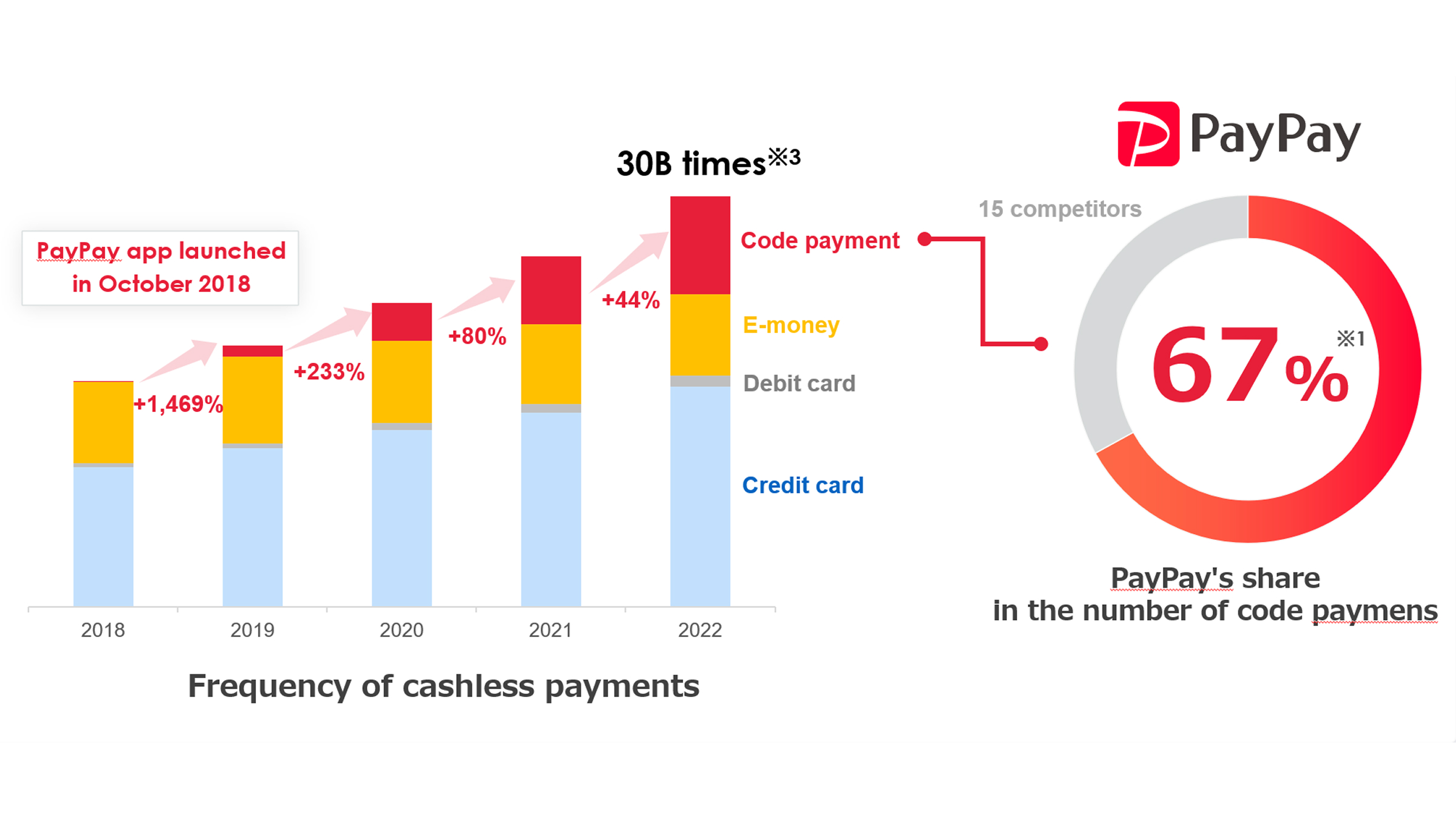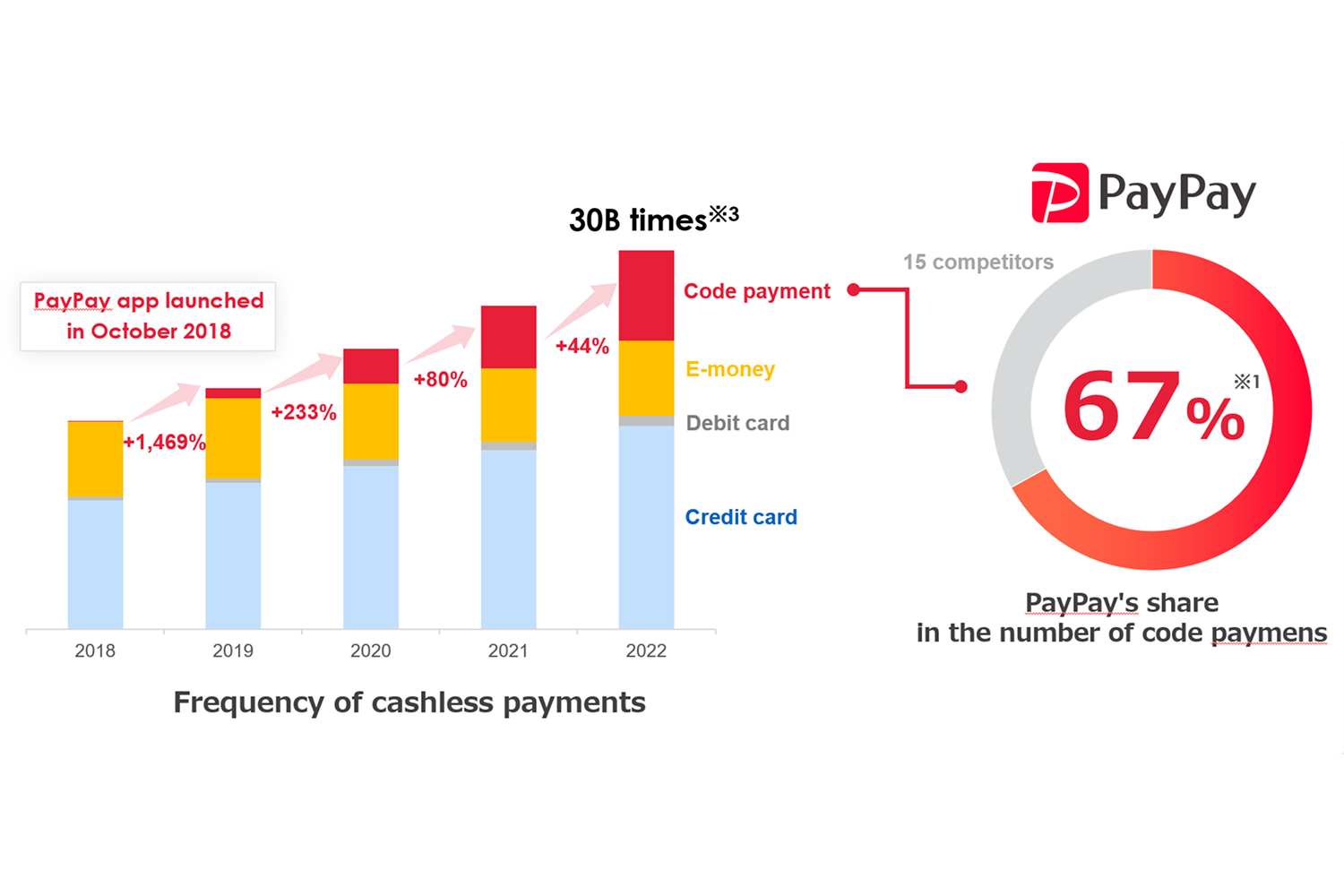PayPay Corporation is pleased to announce that it has achieved a share of approximately 67%*1 in both the annual payment amount and number of payments in 2022 according to “Stats – Code Payment” published by PAYMENTS JAPAN. The number of code payments also surpassed that of prepaid e-money, such as public transport e-money, regarding cashless payments in 2022.
Based on the research results*2 published by the Ministry of Economy, Trade and Industry (METI), cashless payments in Japan in 2022 accounted for 36.0% of all payments, or 111 trillion yen, indicating a good trajectory towards the target of 40% in 2025. In terms of the number of payments, the total number of cashless payments was approximately 30 billion*3, of which 7 billion were code payments, an increase of 44% from the previous year, surpassing e-money for the first time, which accounted for 5.9 billion. With the increasing diversification of payment methods, code payments are becoming more prevalent in everyday life, and is now the second most common cashless payment method after credit cards.


*1. The share of “PayPay” was calculated by PayPay based on the publication by PAYMENTS JAPAN, “Stats – Code Payment,” published on March 3, 2023 and revised on July 7, 2023
*2. “2022 Ratio of Cashless Payment Among the Total Amount Paid by Consumers Calculated,” published by the Ministry of Economy, Trade and Industry on April 6, 2023
*3. Calculated by PayPay based on the total number of credit card transactions in “Monthly Survey: Credit Card Trends,” published by Japan Consumer Credit Association on May 31, 2023, the number of debit card and e-money transactions from “Payment Trends“ by the Bank of Japan on June 30, 2023, and the number of code payments from “Stats – Code Payment,” published by PAYMENTS JAPAN on March 3, 2023 and revised on July 7, 2023.
PayPay launched its code payment service “PayPay” in October 2018, and in 2022 “PayPay” accounted for 67% of all domestic code payments, boasting a stand-alone gross merchandise value (GMV) of 7.3 trillion yen and 4.7 billion payments, growing into the No. 1 *1 code payment service in Japan following the previous year. As the government continues to promote cashlessness, both PayPay and PayPay Card will work together as a team to further expand their presence in the cashless market.
PayPay will continue to offer the convenience of cashless payments to users as well as all kinds of retailers and service providers, with the goal of creating a world in which a safe cashless shopping experience can be enjoyed anywhere in Japan. “PayPay” will continue on the path to evolve from a “payment app” into a “super app” that will make users’ lives richer and more convenient, fostering a culture of “Anytime, Anywhere with PayPay.”
■ About “PayPay,” the cashless payment service provided by PayPay Corporation
PayPay is a cashless payment service expanding across the country, available not only at major chain stores but also at small and medium size retailers, vending machines, taxis, and even public transportation. It can also be used in a variety of other situations, including paying for online services and utility bills. PayPay is also expanding its range of services beyond just payments, including a “send/receive” feature (remittance/transfer and receiving of money) that allows users to transfer their PayPay Balance (PayPay Money and PayPay Money Lite) between each other for free, or “point management,” a service that allows users access to a simulated investment experience involving the exchange of PayPay Points with points provided by a service provider that PayPay is partnered with. The company also strives to create a safe and convenient environment for users through a hotline available 24/7 and a full compensation scheme ensuring, compensation for any damages that may be suffered.
PayPay is registered as follows:
・Prepaid Payment Instruments (third party type) Issuer, Registration #: Director-General of the Kanto Finance Bureau, No. 00710 (Registration date: October 5, 2018)
・Business Operator that Concludes Contracts on the Handling of Credit Card Numbers, etc., Registration #: Kanto (K) No. 106 (Registration date: July 1, 2019)
・Telecommunications Carrier (Filing #: A-02-17943 / Date filed: July 2, 2019)
・Fund Transfer Operator, Registration #: Director-General of the Kanto Finance Bureau, No. 00068 (Registration date: September 25, 2019)
・Notified Person Entrusted with Intermediation (Filing #: C1907980 / Date filed: December 18, 2019)
・Bank Agency Operator, License: Director-General of the Kanto Finance Bureau, No. 396 (Registration date: November 26, 2020)
・Financial instruments intermediary service registration number: Kanto Finance Bureau Director (Kinchu) No. 942 (Registration date: June 25, 2021)
・Japan Payment Service Association (https://www.s-kessai.jp/, Date of admission: September 12, 2018)
・Japan Consumer Credit Association (https://www.j-credit.or.jp/, Date of admission: July 1, 2019)
* “PayPay” provides 4 types of PayPay balance: PayPay Money, PayPay Money Lite, PayPay Points, and Gift Vouchers.
PayPay Money can be used to pay for partner services and in transactions at merchants if the transaction value is within the amount deposited into the PayPay account opened after completing an identity verification process. It can also be used for sending and receiving money between PayPay users free of charge. PayPay Money can also be cashed out to a designated bank account (no withdrawal fee if using PayPay Bank). The legal nature of this is an electromagnetic record which can be used to pay for goods and other services, and can be remitted or cashed out, and is issued by PayPay who is a Fund Transfer Operator registered under Article 37 of the Payment Services Act. Based on the provisions of Article 43 of the Payment Services Act, PayPay protects the debt it owes to its users in by depositing assets equivalent to or more than the debt amount. PayPay Money Lite is an electronic money issued by PayPay, which can be purchased and used to pay for services and merchants. PayPay users can transfer and receive PayPay Money Lite free of charge. The legal nature of this is a prepaid payment instrument issued by PayPay (Article 3, Paragraph 1 of the Payment Services Act). Based on the provisions of Article 14 of the Payment Services Act, PayPay preserves the relevant assets for the purpose of protecting the owners of the prepaid payment instrument by providing a security deposit for issuance to the Legal Affairs Bureau in an amount that is half or more of the unused balance of prepaid instrument methods as of March 31 and September 30. In addition, PayPay Points, which are granted through campaigns and promotions when using PayPay, can be used for partner services and in transactions at merchants in addition to PayPay Money and PayPay Money Lite. However, PayPay Bonus and PayPay Bonus Lite cannot be sent or transferred between PayPay users or be cashed out. PayPay Gift Voucher is a type of electronic money issued by PayPay, which can be used to make payments for affiliated services and merchants designated by the PayPay Gift Voucher. However, it cannot be transferred to other users or cashed out. PayPay Gift Vouchers are valid for six months after issuance, after which they will no longer be valid.
PayPay also strives to create a safe and secure environment for users. If an unexpected payment is made by a third party using a PayPay account, or if a request to settle a payment suddenly arrives from PayPay to a user that does not have a PayPay account, providing that certain conditions are met, the user can be compensated for the damages suffered (the difference will be provided as compensation if compensation is also provided by a third party). Please see applying for compensation for details.
*The company name, trade name, and product/service in this press release are registered trademarks or trademarks of their respective companies.





